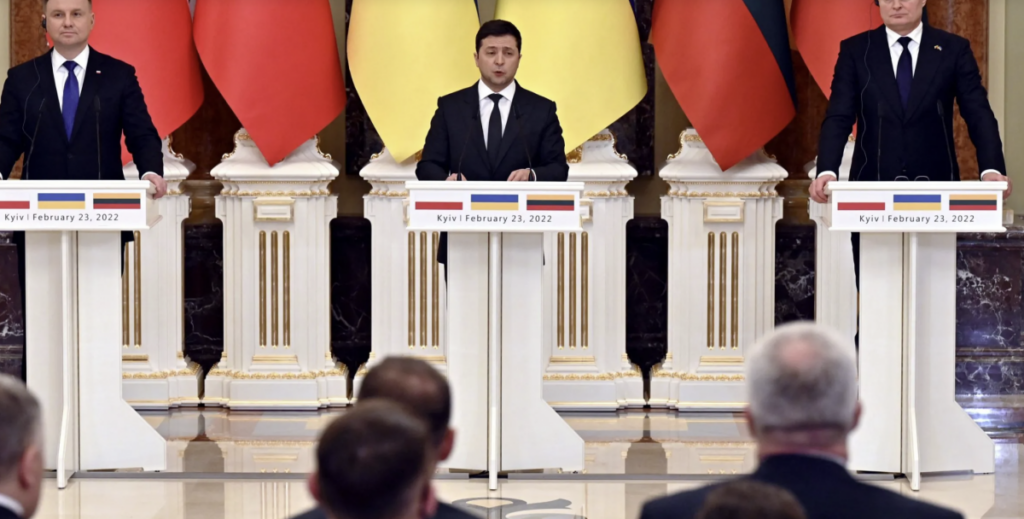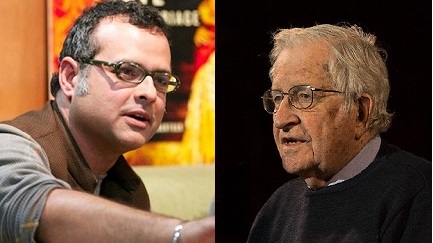Collaboration, Not Confrontation
CONFLICT RESOLUTION - MEDIATION, 25 Sep 2023
Noam Chomsky and Vijay Prashad | Peoples Democracy - TRANSCEND Media Service

February 2022, Ukrainian President Zelensky said Ukrainian and Russian delegations will meet on the border between Ukraine and Belarus for peace talks. Serge Supimsky/AFP via Getty Images.
24 Sep 2023 – Let’s begin with a truism: the Russian invasion of Ukraine will be ended either by defeat of one side or by a diplomatic settlement. That much at least should be beyond debate. A defeat is simply not on the cards, since the west will not allow Ukraine to be totally defeated, and Russia – a major nuclear power – cannot be defeated without the prospect of the introduction of nuclear weapons into the conflict. Since, a defeat of one side or the other is simply not possible, the only way forward is through a diplomatic settlement. The alternative, put simply, is collective suicide as both sides move up the escalation ladder until it is too late.
The United States has articulated a policy that it wishes to continue this war to severely ‘weaken Russia’ – as US defence secretary Lloyd Austin and other high officials have been explicitly stating – and, it is claimed, to place Ukraine in a stronger bargaining position for eventual negotiations (or in a weaker position, if the Russian offensive makes an impact, a strong likelihood that is quietly ignored). The policy of trying to ‘weaken Russia’ through the escalation of the war in Ukraine is the position of the United States and the United Kingdom, and with some variation, their European allies (France, as usual, demurs here and there, but when push comes to shove, lines up with Washington).
EXTINCTION AND ANNIHILATION
The rest of the world, overwhelmingly, is calling for a diplomatic settlement to end the horrors before they become even worse. It will be worse first for Ukraine, which has lost tens of thousands of soldiers and suffered major economic damage across the country (as well as lost substantial parts of its territory to Russia). The Ukrainian counter-offensive has failed. The desperation in Kyiv demonstrates that there are few quivers left in Ukraine president Volodymyr Zelensky’s arsenal.
The severe destruction in Ukraine, however, is nothing like the US-UK shock-and-awe style of war, as we saw against Iraq in 2003 and Libya in 2011, which goes straight to the jugular, demolishing energy, transportation, and communication systems, namely anything that allows a modern society to function; neither has Ukraine experienced the use of illegal and near-illegal weapons systems based on depleted uranium and white phosphorus (used by the United States in Iraq). No heads of state from the western countries visited Baghdad while the US and the UK were demolishing it. The argument about double standards is not a talking point for anyone, but a simple fact based on the evidence.
The bitter costs of the war are, of course, not limited to Ukraine and Russia. Millions are facing starvation as grain and fertilizer supplies are curtailed from the rich Black Sea region, and food prices soar along with the profits of a handful of multinational corporations that dominate the global food system. The Black Sea Grain Initiative – made between Ukraine, Russia, Turkey, and the United Nations in July 2022 for 120 days and then subsequently extended – has moved over twenty million tonnes of grain from the region to the rest of the world; this is much below the normal, but nonetheless – as the UN secretary general António Guterres called a ‘beacon of hope’, an illustration that a wider peace agreement is possible. The fate of this initiative is unknown.
Long before the war, humanity faced the pressing problems of extinction (due to the environmental catastrophe) and annihilation (accelerated by the collapse of the nuclear weapons regulation regime, spurred on by the US unilateral withdrawal from the Anti-Ballistic Missile Treaty in 2002, the Intermediate Nuclear Forces Treaty in 2019, and the Open Skies Treaty in 2020). This conflict in Ukraine and the tensions around the South China Sea make it easy to envision steps up the escalation ladder, with one such step being Russia’s suspension of participation in the New START treaty in February 2023. The limited steps to address imminent environmental catastrophe with the watered-down climate change agreements and the weakened environmental protection treaties do not offer confidence that humanity can prevent the death knell for organised human life on earth, and even these inadequate steps have been reversed in the course of the Ukraine war.
GHASTLY GAMBLE
It is far too little discussed, but the US-UK stance entails a ghastly gamble with the fate of Ukraine and far beyond. The gamble is that if the ‘demented madman’ Putin faces defeat, as the US-UK portray the situation, then he will quietly pack his bags and slink away to oblivion or worse, and will not use the conventional weapons that Russia has at the ready, and which it could use to emulate US-UK war in Iraq and, or of Israel against Gaza, and devastate Ukraine, including Kyiv and the western areas so far mostly spared from the worst of the battles.
A moment’s thought should suffice to reveal the ghastliness of this gamble. One can easily see why outside the western propaganda bubble, much of the world sees the conflict as a proxy war between the United States – using the now buoyant North Atlantic Treaty Organisation (NATO) – and Russia, with Ukrainian bodies as the chessboard. If Ukrainians choose to take the gamble, that’s their business, although it should be remembered that Zelenskyy came to office in 2019 on a peace platform that authorised him to cut a deal with Russia and not escalate the situation to war. The appetite for peace was very much in evidence in Ukraine, including in 2014 when Ukraine’s then president Petro Poroshenko promised to ‘end the war in two weeks’. Now, NATO’s chief Jens Stoltenberg says, ‘We must prepare ourselves for a long war in Ukraine’ (to Germany’s Funke media group in mid-September). The cost will not be paid by ‘we’, but by ordinary Ukrainians and Russians who are dying in large numbers.
That the United States is imposing the gamble on Ukraine (to ‘weaken Russia’), sending arms and building up the illusion of a victory while blocking diplomacy, is incontestable. It has influenced the general mood within Ukraine, turning the possibility of peace into the endless horror of war.
For almost everyone, the war is a disaster, increasingly so the longer it persists. Almost everyone. Some are doing just fine. In the corporate offices of fossil fuel companies and military producers, and the financial institutions that sustain them, euphoria is unbounded. They are enjoying record-breaking profits. In October 2022, the Pentagon said that it was giving out 1.2 billion dollars in contracts to arms manufacturers to replenish US military stocks used in Ukraine, an announcement that sent the stocks of Northrop Grumman up by 40 per cent and of Lockheed Martin up by 37 per cent. Due to the blockage of Russian gas into Europe, western energy companies – Chevron, ExxonMobil, Shell, BP, and TotalEnergies – made 134 billion dollars in excess profits in 2022. The arms and energy firms continue to churn out their toxic products, increasing the prospect for destroying organised human life on earth by exploiting new regions for fossil fuel production and for war.
GLOBAL NATO
In the geopolitical dimension, Washington has registered great gains. Before the escalation of the conflict against Russia (with Ukraine as the flashpoint) and against China (with Taiwan as the flashpoint), NATO edged towards obsolescence. In 2006, Ivo Daalder and James Goldgeier wrote a piece in Foreign Affairs calling for a ‘Global NATO’, a project that then seemed entirely quixotic despite the ‘out of area’ operation by NATO in Afghanistan. Five years later, in 2011, NATO conducted an ‘out of area’ operation against Libya, whose actions had not triggered Article 5 that enjoins the alliances only to enter in defence of a member state. But even the adventure in Libya, which virtually destroyed that country, did not drive the momentum towards giving NATO a lease of life after the Cold War and indeed to allow it a global footprint. It was the New Cold War against China and Russia that brought the idea of Global NATO to the fore and allowed the United States to use NATO as an instrument to revitalise the deteriorating Atlantic alliance (threatened as Europe was integrating with Russia for energy and with China for investment). Putin’s invasion of Ukraine cemented the revitalisation of NATO, giving the United States a marvellous gift on a silver platter: Europe.
Since Second World War, there has been deep concern in Washington that Europe might move on an independent course, developing its very natural commercial and other relations with the east – a ‘marriage made in heaven’, as some economists describe it, between German-based advanced industrial Europe and the rich material resources of the east, with the enormous China-based market beckoning beyond. Those opportunities became more real after the collapse of the Soviet Union, when Mikhail Gorbachev proposed a ‘common European home’ from Lisbon to Vladivostok, with no military alliances, no victors and defeated, and common steps towards a social democratic future. That was not to be. US president Bill Clinton launched a new cold war by violating the firm and unambiguous promise by President George H W Bush that NATO would not expand one inch to the east of Germany if Gorbachev agreed to allow Germany to be unified and furthermore, to join NATO, a hostile military alliance – not a small concession in the light of history. Clinton betrayed the handshake agreement made by US secretary of state James Baker and the last Soviet foreign minister Eduard Shevardnadze on February 9, 1990, an agreement about which there is a great deal of deceit by western commentators but which was indeed firm and unambiguous as can be seen from the actual text of the agreement (‘There would, of course, have to be iron-clad guarantees that NATO’s jurisdiction or forces would not move eastward. And this would have to be done in a manner that would satisfy Germany’s neighbours to the east’; at that time, Baker said to Mikhail Gorbachev,‘We understand the need for assurances to the countries in the East. If we maintain a presence in a Germany that is a part of NATO, there would be no extension of NATO’s jurisdiction for forces of NATO one inch to the east’). NATO’s head Jens Stoltenberg recently acknowledged that this war is due to his organisation’s eastward provocation.
NATO began its march eastward by absorbing the Czech Republic, Hungary, and Poland (in 1999), Bulgaria, Estonia, Latvia, Lithuania, Romania, Slovakia, and Slovenia (in 2004), Albania and Croatia (in 2009), Montenegro (in 2017), and finally North Macedonia (in 2020). At the 2008 Bucharest Summit, overruling French and German objections under US pressure, the NATO member states agreed that Georgia and Ukraine ‘will become members of NATO in the future’. This was held in April 2008, and just a few months later, in August, Georgia and Russia fought a war over the breakaway Russian-majority areas of Abkhazia and South Ossetia – a war that was a prelude to the conflict around Ukraine. Russia’s president Vladimir Putin had sounded the alarm at the 2007 Munich Security Conference, when he said that the world does not need a ‘single master’ and where he suggested the necessity for security guarantees for Russia. These points were disregarded, and Putin – who had been a loyal ally of the west – was now denigrated for his audacity to question US leadership (this is when Putin, the great democrat to Bush and Blair before 2007, became the great dictator). The US unilateral withdrawal from nuclear weapons treaties suggested to the Russians that the west might not only expand NATO but place lethal weaponry within striking distance of major Russian cities, which would not be able to protect themselves. This steady march toward confrontation – including the US meddling in the politics of Ukraine a decade ago – leads directly to today’s horror show, with worse to come if this is not brought to an end.
NEW COLD WAR
With Europe now safely in Washington’s pocket, at least for now, the United States has been able to extend the NATO military alliance to the Indo-Pacific region, enlisting NATO in its confrontation with China, which is even more ominous than the terrible events in Europe. The US Indo-Pacific project includes the building up of military alliances around China (such as the Quad – with Australia, India, and Japan) and by the creation of NATO Plus (which includes Australia, Israel, Japan, New Zealand, and South Korea).
The neoconservatives who run US president Joe Biden’s foreign policy have ramped up this confrontation against China. In official terminology, China is now ‘encircled’ by ‘sentinel states’, who are armed with advanced US precision weapons aimed at China, backed by massive naval manoeuvres in the Pacific Ocean. Nuclear-capable B-52s are now based in Darwin (Australia) and in Guam, within easy striking distance of China.
Taiwan is the major flash point. In late February 2023, US House Foreign Affairs Committee chairman Michael McCaul told ABC News that it is ‘Ukraine today. It’s going to be Taiwan tomorrow’. For fifty years, the One China policy has kept peace in Taiwan, not an inconsiderable achievement in international affairs. It is now seriously threatened, primarily by highly provocative US initiatives that are familiar: the visit of US elected officials led by house speaker Nancy Pelosi was followed by other reckless acts of this nature. The Taiwan Policy Act (2021-2022) passed by the Senate Foreign Relations Committee calls for granting Taiwan the diplomatic status of a non-NATO ally, with no diplomatic restrictions, along with enhanced military aid and training and interoperability of military forces – all eerily similar to Ukraine policies of the past decade.
Most serious of all, Biden’s team has now declared economic war on China, as it is rightly termed by the international financial press, designed to prevent China’s technological development. The trade war against China and now the militarisation of that trade war is not about ‘Chinese aggression’ but about the failure of US businesses to compete with Chinese businesses. Rather than allow for competition, the US government has intervened with sanctions against these sectors and against specific companies (such as Huawei). As in the case of unilateral US sanctions against other countries (such as Cuba, Venezuela, and Iran), other states and businesses must observe them whether they like it or not; typically, they don’t like it, but in that case, tough luck. It is dangerous to defy the master. This godfather-like policy towards China is a further blow to Europe, which is already facing a form of deindustrialisation as it follows US demands about cutting energy purchases from Russia and cutting investments from China. The Netherlands, for example, has the world’s most advanced lithographic industry, a prime component in production of the semiconductors that are the core of the advanced economy. Losing the rich China market, under US threats, would be no small blow. The same is true for South Korea’s Samsung and for Japan’s advanced industries. How long they will be willing to endure all of this is one of the many uncertainties in the troubled world scene.
Meanwhile China is proceeding with its global loan and development projects, incorporating Eurasia, extending to Africa, the Middle East, and even to the US backyard in Latin America, much to Washington’s distress. The Belt and Road Initiative – now a decade old – and the concessionary lending by the People’s Bank of China in local currencies comes alongside the fact that China is now the leading trade partner with most countries in the global south. Despite the pandemic and the anti-China policies of the US government, in November 2020 fifteen countries met in Hanoi (Vietnam) to join the Regional Comprehensive Economic Partnership (RCEP) to create the largest trading bloc in history, one that is anchored by the Chinese economy. The United States is not in RCEP, and the US government’s own Trans-Pacific Partnership is now defunct.
There is a famous ditty of Hilaire Belloc’s about the British empire in its heyday: ‘Whatever happens we have got, the maxim gun and they have not’. Guns are not enough to stop China’s development and expansion of its influence, and efforts at economic strangulation are not very likely to succeed either. Most of the world is having nothing to do with it and is moving towards a world order that has ‘no single master’, an order where regionalism has come to be an effective institutional force and where regionalism plus (such as through alliances like BRICS with Brazil, Russia, India, China, and South Africa – now expanded by six major countries, including leading producers of energy) playing an increasingly important role in world affairs (initially in trade relations, but increasingly in the world of politics).
A final word. Everything we have discussed is clinically insane, the behaviour of societies gone completely mad as they stampede to suicide. There’s a reason why the hands of the Doomsday Clock were advanced to 90 seconds to midnight. We are racing towards destruction of the environment that sustains life. Terminal nuclear war is an increasing threat in Europe and Asia. New pandemics are likely, which may make this one look like a picnic in the park. None of these lethal dangers have boundaries. The great powers will either find ways to accommodate and to cooperate for the common good, or they will all collapse together. At the start of the pandemic, the head of the World Health Organisation Dr Tedros Adhanom Ghebreyesus urged the countries of the world to be more collaborative and less confrontational. Common problems needed common solutions, he said. These are wise words, and they need to be heeded.
____________________________________________
 Avram Noam Chomsky is an American linguist, philosopher, cognitive scientist, historian, logician, social critic, and political activist. Sometimes described as “the father of modern linguistics,” Chomsky is also a major figure in analytic philosophy, and one of the founders of the field of cognitive science. He has spent more than half a century at the Massachusetts Institute of Technology (MIT), where he is Institute Professor Emeritus, and is the author of over 100 books on topics such as linguistics, war, politics, mass media, US foreign policy, social issues, Latin American and European history, and more. His latest books are Failed States, The Abuse of Power and the Assault on Democracy and Hegemony or Survival, both in the American Empire Project series at Metropolitan Books. noamchomsky@email.arizona.edu
Avram Noam Chomsky is an American linguist, philosopher, cognitive scientist, historian, logician, social critic, and political activist. Sometimes described as “the father of modern linguistics,” Chomsky is also a major figure in analytic philosophy, and one of the founders of the field of cognitive science. He has spent more than half a century at the Massachusetts Institute of Technology (MIT), where he is Institute Professor Emeritus, and is the author of over 100 books on topics such as linguistics, war, politics, mass media, US foreign policy, social issues, Latin American and European history, and more. His latest books are Failed States, The Abuse of Power and the Assault on Democracy and Hegemony or Survival, both in the American Empire Project series at Metropolitan Books. noamchomsky@email.arizona.edu
 Vijay Prashad is an Indian historian, editor and journalist. He is a writing fellow and chief correspondent at Globetrotter. He is the director of Tricontinental: Institute for Social Research and a senior non-resident fellow at Chongyang Institute for Financial Studies, Renmin University of China. He has written more than 20 books, including The Darker Nations and The Poorer Nations. His latest book is Washington Bullets, with an introduction by Evo Morales Ayma.
Vijay Prashad is an Indian historian, editor and journalist. He is a writing fellow and chief correspondent at Globetrotter. He is the director of Tricontinental: Institute for Social Research and a senior non-resident fellow at Chongyang Institute for Financial Studies, Renmin University of China. He has written more than 20 books, including The Darker Nations and The Poorer Nations. His latest book is Washington Bullets, with an introduction by Evo Morales Ayma.
Go to Original – peoplesdemocracy.in
Tags: Capitalism, Competition, Cooperation, Diplomacy, European Union, NATO, Proxy War, Russia, UK, USA, Ukraine, WWIII, War Economy, Warfare
DISCLAIMER: The statements, views and opinions expressed in pieces republished here are solely those of the authors and do not necessarily represent those of TMS. In accordance with title 17 U.S.C. section 107, this material is distributed without profit to those who have expressed a prior interest in receiving the included information for research and educational purposes. TMS has no affiliation whatsoever with the originator of this article nor is TMS endorsed or sponsored by the originator. “GO TO ORIGINAL” links are provided as a convenience to our readers and allow for verification of authenticity. However, as originating pages are often updated by their originating host sites, the versions posted may not match the versions our readers view when clicking the “GO TO ORIGINAL” links. This site contains copyrighted material the use of which has not always been specifically authorized by the copyright owner. We are making such material available in our efforts to advance understanding of environmental, political, human rights, economic, democracy, scientific, and social justice issues, etc. We believe this constitutes a ‘fair use’ of any such copyrighted material as provided for in section 107 of the US Copyright Law. In accordance with Title 17 U.S.C. Section 107, the material on this site is distributed without profit to those who have expressed a prior interest in receiving the included information for research and educational purposes. For more information go to: http://www.law.cornell.edu/uscode/17/107.shtml. If you wish to use copyrighted material from this site for purposes of your own that go beyond ‘fair use’, you must obtain permission from the copyright owner.
Read more
Click here to go to the current weekly digest or pick another article:
CONFLICT RESOLUTION - MEDIATION:
